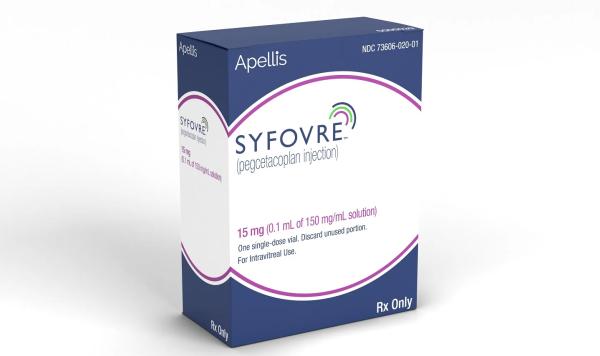Syfovre Side Effects
Generic name: pegcetacoplan ophthalmic
Medically reviewed by Drugs.com. Last updated on Feb 5, 2025.
Note: This document provides detailed information about Syfovre Side Effects associated with pegcetacoplan ophthalmic. Some dosage forms listed on this page may not apply specifically to the brand name Syfovre.
Applies to pegcetacoplan ophthalmic: intraocular solution.
Precautions
Your eye doctor will want to check your progress closely and at regular visits, especially during the first few days after you receive this medicine, to make sure this medicine is working properly and to check for unwanted effects.
Receiving this medicine while you are pregnant can harm your unborn baby. Use an effective form of birth control to keep from getting pregnant during treatment and for at least 40 days after the last dose. If you think you have become pregnant while receiving this medicine, tell your doctor right away.
Serious eye or vision problems (eg, retinal detachment, endophthalmitis, eye infection, increased pressure inside the eye, or neovascular AMD) may occur with this medicine. Check with your eye doctor right away if your have blurred or other change in vision, eye pain, eye redness, seeing flashes or sparks of light, seeing floating spots before the eyes, or a veil or curtain appearing across part of vision, sensitivity of the eye to light, or tearing of the eyes several days after you receive this medicine.
This medicine may cause temporary blurred vision. Do not drive or do anything else that could be dangerous until you can see clearly.
Serious side effects of Syfovre
Along with its needed effects, pegcetacoplan ophthalmic (the active ingredient contained in Syfovre) may cause some unwanted effects. Although not all of these side effects may occur, if they do occur they may need medical attention.
Check with your doctor or nurse immediately if any of the following side effects occur while taking pegcetacoplan ophthalmic:
More common side effects
- bloody eye
- eye pain
- painful irritation of the clear front part of the eye
- redness of the eye
Less common side effects
- blindness
- blurred or change in vision
- seeing flashes or sparks of light
- seeing floating spots before the eyes, or a veil or curtain appearing across part of vision
- sensitivity of the eye to light
- tearing
Rare side effects
- headache
- red or bloodshot eye
Other side effects of Syfovre
Some side effects of pegcetacoplan ophthalmic may occur that usually do not need medical attention. These side effects may go away during treatment as your body adjusts to the medicine. Also, your health care professional may be able to tell you about ways to prevent or reduce some of these side effects.
Check with your health care professional if any of the following side effects continue or are bothersome or if you have any questions about them:
- Feeling like something is in the eye
See also:
For healthcare professionals
Applies to pegcetacoplan ophthalmic: intravitreal solution.
General adverse events
The most common adverse reactions with frequency of 5% or greater were ocular discomfort, neovascular age-related macular degeneration, vitreous floaters, and conjunctival hemorrhage.[Ref]
Ocular
- Very common (10% or more): Ocular discomfort (13%), neovascular age-related macular degeneration (12%), vitreous floaters (10%)
- Common (1% to 10%): Conjunctival hemorrhage, vitreous detachment, retinal hemorrhage, punctate keratitis, posterior capsule opacification, intraocular inflammation, intraocular pressure increased, optic ischemic neuropathy
- Frequency not reported: Endophthalmitis, retinal detachment, hyphema, retinal tears[Ref]
Ocular discomfort included eye pain, eye irritation, foreign body sensation in eyes, ocular discomfort, abnormal sensation in eye.
Neovascular age-related macular degeneration included exudative age-related macular degeneration, choroidal neovascularization.
Punctate keratitis included punctate keratitis, keratitis.
Intraocular inflammation included vitritis, vitreal cells, iridocyclitis, uveitis, anterior chamber cells, iritis, anterior chamber flare.[Ref]
Other
- Common (1% to 10%): Death[Ref]
Deaths were reported in 6.7% of patients treated monthly, 3.6% of patients treated every other month and 3.8% of patients assigned to sham. The rates and causes of death were consistent with the elderly study population.[Ref]
References
1. (2023) "Product Information. Syfovre (pegcetacoplan ophthalmic)." Apellis Pharmaceuticals, Inc.
Frequently asked questions
- How do Izervay and Syfovre compare?
- Is Syfovre covered by Medicare?
- How effective is Syfovre for macular degeneration?
More about Syfovre (pegcetacoplan ophthalmic)
- Check interactions
- Compare alternatives
- Pricing & coupons
- Reviews (6)
- Drug images
- Dosage information
- During pregnancy
- FDA approval history
- Drug class: miscellaneous ophthalmic agents
- Breastfeeding
- En español
Patient resources
Professional resources
- Syfovre Injection prescribing information
- Pegcetacoplan (Geographic Atrophy) (Local) (AHFS Monograph)
Related treatment guides
Further information
Syfovre side effects can vary depending on the individual. Always consult your healthcare provider to ensure the information displayed on this page applies to your personal circumstances.
Note: Medication side effects may be underreported. If you are experiencing side effects that are not listed, submit a report to the FDA by following this guide.

